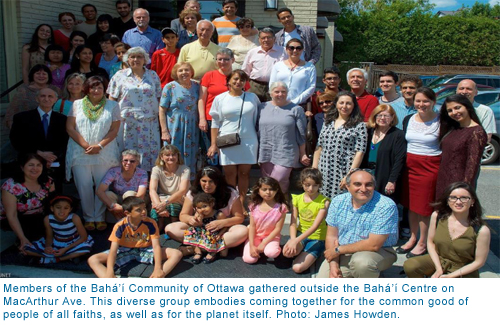
From Division to Unity: Well-Being for Everyone
October - December 2017
by
James Howden James is a member of the Ottawa Bahá’í community. Here he
reflects on individual choices and shared responsibilities towards a
just and sustainable society.

We’re
a small community, but that’s no excuse for inaction when
it comes to ecological stewardship or other facets of the common good.
Bahá’u’lláh, founder of the Bahá’í Faith, urges us
all to be “anxiously concerned with the
needs of the age.”
Naturally,
questions of environmental action have taken on a growing importance.
For example, waste reduction and disposal, and the search for harmless
methods of beautification, have been key considerations in developing
the local Bahá’í Centre on MacArthur Ave.
In March 2017, the
stakes were raised. The Bahá’ís of the world received a letter From
Division to Unity: Well-Being for Everyone from our elected
international council, the Universal House of Justice. It called us to
consider deeply how our economic decisions reflect our faith and affect
our surroundings.
“Humanity’s collective life suffers,” they
wrote, “when any one group thinks of its own well-being in isolation
from that of its neighbours or pursues economic gain without regard for
how the natural environment...is affected.”
How can humanity
progress when narrow self-interest trumps the welfare of all? “The
teachings of the Faith leave no room for doubt: there is an inherent
moral dimension to the generation, distribution, and utilization of
wealth and resources.”
The challenge is obvious: to put into
practical, daily terms what our teachings say about “justice and
generosity” and the creation of a peaceful global society. “Every
choice a Bahá’í makes...leaves a trace, and...one’s economic decisions
[must] be in accordance with lofty ideals.”
What are these aims?
Oh, not much – merely to be “a source of social good”, “the cause of
peace and well-being, of happiness and advantage” to everyone around
us! It is an ethic of service founded on spiritual behaviour, something
little encouraged by our wider society.
As the House of Justice
points out, “The forces of materialism promote a quite contrary line of
thinking: that happiness comes from constant acquisition...that worry
for the environment is for another day. These seductive messages fuel
an increasingly entrenched sense of personal entitlement, which uses
the language of justice and rights to disguise self-interest.”
One
of Bahá’u’lláh’s most strongly worded principles is for the elimination
of extremes of wealth and poverty. Such growing disparity is one of the
monstrous barriers that block our “transition from a divided world to a
united one”.
The ongoing development of the Bahá’í
administrative order is a wonderful achievement. However, we are still
a relatively young community, and the House of Justice’s call to
mindfulness of economic justice is addressed mainly to individuals.
It’s clear that the environmental impact of our choices is among the
most critical dimensions of such personal daily decisions.
The
Ottawa Bahá’í Centre has been in operation for over ten years. Its
programs of recycling, energy efficiency, waste reduction, and organic
outdoor beautification have been quiet examples of the significance of
decisions made from a world-embracing, spiritual perspective.
In
recent months, many families have included ecological and social
justice themes in their neighbourhood prayer meetings. One of our
eco-warriors spearheaded a major bike-share operation in the city.
Another sponsored a talk – a superb introduction to the UN’s
Sustainability Goals – by Victoria Thoresen, chair of UNESCO’s
sustainability education program; in town for a UN conference, she
shared her deep engagement and perspective with us.
More
recently, one early-adopting owner of an electric vehicle formally
proposed setting up a charging station in the Bahá’í Centre’s parking
lot, and the community is currently studying its feasibility – the list
goes on!
But we don’t act alone. We have learned what many
others understand: a critical element in creating resilient,
sustainable societies is to forge ties among many community groups,
regardless of their particular faith orientation (or the lack thereof).
It may be that growing our network of connections with other groups and
individuals is our most important work of all.
|